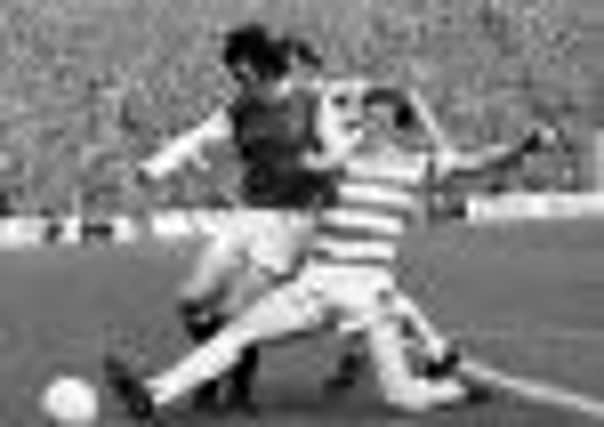Glenn Gibbons: Lack of practice may be Hibs’ biggest cup hurdle


As a consequence, even the most irrational supporter of the Easter Road club could surely not deny that the greatest threat to their prospects in the 2012 final against Hearts on 19 May is likely to be their lack of practice.
Two cup final appearances in the last quarter of the 19th century, a paltry eight through the 100 years between 1901 and 2000 and a further two since the dawning of the 21st have, infamously, yielded a miserable two triumphs – the last of those 110 years ago – and subjected Hibs followers to the kind of perennial ridicule normally reserved for British ski jumpers.
Advertisement
Hide AdAdvertisement
Hide AdIn such fraught circumstances, the search for encouraging portents tends to begin the moment the referee’s whistle brings the successful semi-final to a close. These seem, alas, to remain well hidden. Anyone scrutinising Hibs’ history in the tournament – this even includes failure during the glorious post-war period of the Famous Five team winning three league championships – is likely to conclude that they are simply cursed.
The last time their appearance in the final occurred in a year that had a “ring” to it, in 1972 (where did those 40 years go?), there was unmistakable conviction that this 70th anniversary of their last triumph would bring an end to the hoodoo.
The team boasted seven internationals, while the non-appearance in a Scotland jersey of Alex Edwards, Alan Gordon and Jimmy O’Rourke will forever remain a scandal. And they were playing a Celtic side who, although wide-margin winners of the league, had just two weeks earlier suffered the morale-sapping disaster of losing a European Cup semi-final on penalties to Internazionale, denying them a third appearance in the final.
Hibs’ optimism proved to be painfully misplaced. Dixie Deans, who had notoriously missed the penalty that brought the European elimination, took the whole thing very personally, rampaging through the game with a hat-trick as Celtic racked up an all-time record-equalling 6-1 victory. This time, perhaps the Hibs boys would be best advised to keep their confidence a secret.
Ex-players as referees is a red card idea
Of all the suggestions thrown into the crucible that bubbles with the debate on refereeing standards, the one most deserving of instant dissolution is the idea that an often difficult job would be best served by being executed by former players.
The invasion of TV punditry by ex-professionals over the past 20 years or so – featuring their frequently embarrassing ignorance and eccentric interpretations of the laws – should have been enough to render such nonsense obsolete.
But recent days have not only revealed an alarmingly large number of advocates of the mass conversion of people from poaching to gamekeeping, but provided reasons for the happening that are as absurd as the idea itself.
It was proposed, for example, that a former player would be “on the same wavelength” as those whose actions he was overseeing and judging; as a consequence, it was concluded, his decisions (excellent or appalling) would be more readily accepted. Astonishingly, the author of this gem seemed to be serious.
Advertisement
Hide AdAdvertisement
Hide AdIn the matter of discipline, the case for equipping former players with a whistle, a pencil, a notebook, assorted cards and (gulp) unchallengeable authority was “reinforced” by the observation that “he could spot a leg breaker and punish it with a red card.”
Thanks to perfect timing by the mischievous deities who arrange these things, that ludicrous theory was put to the test on the very evening it was posted. Any committed punter in search of the fabled “certainty” could have emptied his pockets on an ex-pro on TV exposing the unsoundness of his judgement.
The only unusual aspect of the event was that the commentator in question should be Alan Smith, the former Arsenal striker, now working for satellite television. Smith is normally one of the few refreshing exceptions to the general muddleheadedness of his fellow members of the fraternity.
The incident occurred in the closing minutes of the Bayern Munich-Real Madrid Champions League match, when Marcelo, the Real player, deliberately kicked Thomas Muller from behind. As the Bayern players, properly outraged, converged on both Marcelo and referee Howard Webb, Smith watched a replay and offered the barely credible opinion that, “it wasn’t much, because he only caught him with his shin, he didn’t have his studs raised”.
Webb, as unreliable as most other match officials, waited for the furore to subside before issuing a yellow card. It was as pathetic a cop-out as the same referee’s failure to dismiss Nigel de Jong of the Netherlands for a chest-high lunge on Spain’s Xavi Alonso during the 2010 World Cup final.
Smith’s apparent trivialising of what most reasonable people would surely regard as a deliberate assault made him typical of a group notorious for their readiness to accept all manner of felonies as an unremarkable part of the game.
In Scotland, the former Celtic striker, Andy Walker, has habitually argued on air and in the Sunday newspaper he used to write for that shirt-pulling, wrestling and even diving in order to win a penalty or have an opponent sent off are legitimate behaviour and that any player who escapes censure for such chicanery should, in effect, be given a bonus by grateful employers. No concession ever seemed to be made to the fact that these actions are specifically prohibited by the laws of the game.
But players are mainly prevented from becoming referees by their ego. It is a variation on the old axiom that says those who can, do; those who can’t, teach. Football’s version says that those who can, play; those who can’t, referee.